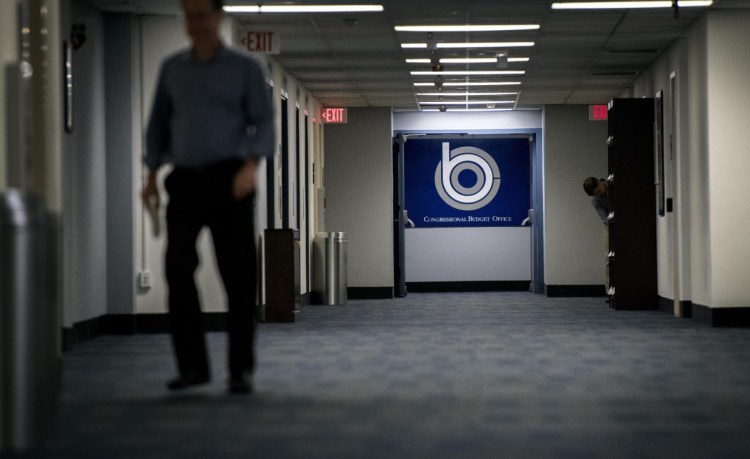WASHINGTON — America’s deficit is rising sharply and will surpass $1 trillion per year by 2020, a gap that has grown since Congress cut taxes and increased spending, the Congressional Budget Office reported Monday.
The federal deficit – the gap between how much the government takes in and how much it spends – will hit $804 billion in fiscal 2018, up 21 percent from 2017, the CBO said.
“The federal budget deficit grows substantially over the next several years,” CBO Budget Director Keith Hall said Wednesday after his agency released the report. “Federal debt is projected to be on a steadily rising trajectory throughout the decade.”
The tax law that President Trump and congressional Republicans passed in December will cut government revenue by $1.3 trillion from 2018 to 2028, the CBO reported. When the costs of paying interest on that debt are included, the tax cuts’ total addition to the deficit comes to $1.9 trillion, the CBO said.
During debate on the bill, Republican leaders predicted that their proposal would spark massive economic growth that would limit – or even eliminate – additions to the deficit. But the CBO projected Monday that the bill would boost economic growth 0.7 percent over a decade – not enough to keep it from adding to the deficit.
Members of both parties further added to the deficit in March when they increased military and domestic spending by nearly $300 billion over the next two years.
The CBO reported that from 2021 to 2028, deficits will average 4.9 percent of the total American economy – higher than at any point since World War II other than during the recession in 2008 and 2009.
Annual deficits topped $1 trillion from 2009 to 2012, because of greater spending on social safety net programs and economic stimulus, as well as slumping tax receipts as the economy cratered. But the current deficit increases come amid steady economic growth and low unemployment, a time when many economists recommend paying down the deficit.
The ballooning deficits reflect a growing gap between the level of military services and social spending the government is promising and how much it’s willing to tax Americans to pay for them. The current national debt, including projected future spending on social programs, totals more than $20 trillion.
“We’ve had a big tax cut and a big spending increase, and they’re showing up here,” said Benjamin Page, a senior fellow at the Tax Policy Center, a nonpartisan think tank.
Republicans and Democrats alike bemoaned the growing deficits Monday but offered opposing suggestions for how to deal with it.
Senate Minority Leader Chuck Schumer, D-N.Y., blamed the new tax law.
“The CBO’s latest report exposes the scam behind the rosy rhetoric from Republicans that their tax bill would pay for itself,” Schumer said in a statement Monday.
Send questions/comments to the editors.



Success. Please wait for the page to reload. If the page does not reload within 5 seconds, please refresh the page.
Enter your email and password to access comments.
Hi, to comment on stories you must . This profile is in addition to your subscription and website login.
Already have a commenting profile? .
Invalid username/password.
Please check your email to confirm and complete your registration.
Only subscribers are eligible to post comments. Please subscribe or login first for digital access. Here’s why.
Use the form below to reset your password. When you've submitted your account email, we will send an email with a reset code.